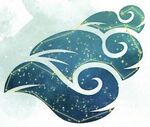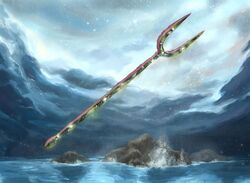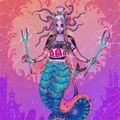Thassa
| Thassa | |
|---|---|
|
Great Eye God of the Sea | |
| Information | |
| Colors |
|
| Species | God |
| Birth, Life & Death | |
| Birthplace | Theros |
| Divinity | |
| Abode | Sea |

Thassa (/θɑːsɑː/, THAH-sah[1]) is the God of the Sea on Theros. She is associated with blue mana and governs not only the physical oceans but also more abstract domains like gradual change, long-term transformation, ancient knowledge, and introspection. Thassa embodies the slow but relentless forces of nature, reshaping coastlines, uncovering secrets, and altering the world across eons. She is widely worshipped by tritons and coastal humans alike, particularly in the polis of Meletis. Her favored offerings range from fish and salt to pearls, and she is venerated through silent contemplation, tidal rituals, and seaborne festivals.
Description
Domains
Thassa is the god of the sea and is also associated with aquatic creatures and the secrets of the briny deep.[2] She holds sway over tides, currents, long voyages, gradual change, ancient knowledge, and deep introspection. Thassa also governs metaphorical aspects of the sea, such as slow transformation and persistent natural forces like erosion and time-weathering. Unlike Nylea, who embodies cyclical seasons, or Kruphix, who monitors time itself, Thassa rules the continuous, inevitable change that unfolds across ages. Krakens and other deep-sea leviathans are among her most prized creations, typically kept far from mortals unless Thassa is displeased.
Personality
Thassa is the god least content with permanence but also the least prone to impulsive change. She enacts her will through slow, deliberate transformations and seldom intervenes directly in mortal affairs. She typically speaks in the future tense, reflecting her preoccupation with what lies ahead rather than present concerns. Though slow to anger, once roused, she is as destructive and unrelenting as a tidal wave, and her wrath can level entire settlements before receding into the depths. Thassa is known to laugh rarely, and when she does, it is more often smug than joyful.
Thassa usually appears as a towering, triton-like figure with octopus-tentacle hair and a crab-legged crown. She prefers to be seen from afar, but may manifest closer as a fog bank, a storm, a swarm of sharks, or other oceanic forms. At times, her voice can be heard whispered across waves or through hissing droplets upon the surface.
Worship
Tritons are Thassa's most devoted worshippers, and nearly all tritons hold unwavering reverence for her.[2] Human worship is common in coastal regions, particularly among sailors, fishers, and those dependent on the sea's bounty. Thassa receives offerings of salt and fish from the poor, pearls from the wealthy, and silent prayers from all. In Meletis, she is honored both by sailors seeking safe passage and by philosophers who respect her association with long-term knowledge and transformation. The week-long Lyokymion festival, or Feast of the Melting Swell, celebrates the new year with a focus on the sea’s bounty and Thassa’s grace. Human worshippers often pray at the changing tides, sometimes walking barefoot on the tidal flats to commune with her domain.[3]
Signature Item

Thassa once wielded the bident Dekella, a divine weapon that could stir the seas and summon massive whirlpools.[2] According to legend, a mortal once stole Dekella to destroy a rival fleet and was punished when Thassa turned his family into eels. Dekella was later stolen by the planeswalker Kiora,[4] and Thassa received a new divine spear from Purphoros to replace it.
Divine Relationships
Thassa disdains the shortsighted ambitions of other gods who seek to impose lasting order, considering such efforts futile in the face of inevitable change. She does not fear her fellow deities and regards her dominion as unassailable. Heliod considers her his favorite sibling, though Thassa often rejects his vision of eternal order. She once aided Purphoros when Kruphix clouded his mind, and while they share a belief in change, Thassa prefers slow evolution to Purphoros’s volatile destruction. She has little regard for gods like Ephara, Karametra, Pharika, Mogis, and Iroas, whose domains she considers transient and best left to mortals.[3]
History
Thassa, like the other gods of Theros, was affected by the Silence of the Gods, which temporarily prevented divine influence over mortal affairs.[5] Despite her usual indifference to immediate events, she has been known to intervene subtly in matters of divine balance or oceanic consequence.
Inspiration
The character of Thassa draws primarily from Greek sea deities, especially Poseidon and the primordial goddess Thalassa, the latter of whom shares her name. Her fish-tailed, triton-like body recalls Triton, while her fearsome, shifting forms resemble the monstrous Ceto. Her domain, personality, and worship practices blend these classical archetypes into a uniquely Therosian interpretation of divine change and the unknowable ocean.
Gallery
-
Thassa, God of the Sea. Art by Jason Chan.
Story appearances
In-game references
- Represented in:
- Associated cards:
- Depicted in:
- Quoted or referred to:
- Drag Under (Foundations Jumpstart)
- Ephara, Ever-Sheltering
- Eutropia the Twice-Favored
- Floodtide Serpent
- Gainsay (Theros)
- Godhunter Octopus
- Griptide (Theros)
- Kiora's Follower
- Kraken of the Straits
- Nullify
- Nyxborn Triton
- Pin to the Earth
- Riptide Turtle
- Tightening Coils
- Thryx, the Sudden Storm
- Tidal Wave (Eternal Masters)
- Towering-Wave Mystic
- Triton Fortune Hunter
- Whelming Wave
References
- ↑ Wizards of the Coast (September 26, 2013). "Theran Pronunciation Quiz". magicthegathering.com. Wizards of the Coast. Archived from the original on 2021-04-30.
- ↑ a b c (2013). Theros Player's Guide. Wizards of the Coast.
- ↑ a b Wizards RPG Team (2020), D&D Mythic Odysseys of Theros, Wizards of the Coast
- ↑ Kelly Digges (May 20, 2015). "Drop for Drop". magicthegathering.com. Wizards of the Coast. Archived from the original on 2015-05-22.
- ↑ Jenna Helland (April 2014). "Theros: Godsend, Part I." Wizards of the Coast. ISBN 978-0-7869-6556-4.
External links
- The Magic Creative Team (August 21, 2013). "Planeswalker's Guide To Theros part 1". magicthegathering.com. Wizards of the Coast.
- Theros: Godsend, Part I
- Journey into Nyx: Godsend, Part II



